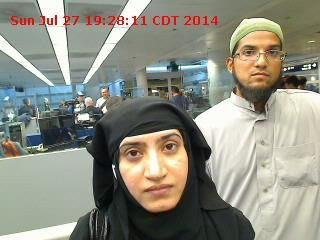No Evidence California Attackers Were Part Of Terrorist Cell, FBI Says

There is no evidence a married couple who killed 14 people in California this month were part of a terrorist cell, the head of the FBI said on Wednesday, confirming that investigators believe the pair were inspired but not directed by Islamic State.
The Islamist militant group has "revolutionized" terrorism by seeking to inspire such small-scale attacks, FBI Director James Comey said, noting the group uses social media, encrypted communications and slickly produced propaganda to recruit followers around the world.
"Your parents' al Qaeda was a very different model than the threat we face today," Comey told a counterterrorism conference in New York.
However, he said that while the perpetrators of the Dec. 2 shootings in San Bernardino, California - Syed Rizwan Farook, 28, and Tashfeen Malik, 29 - had expressed support for "jihad and martyrdom" in private communications as early as 2013, they never did so publicly on social media.
He also said authorities believe Mohammed Abdulazeez, the suspect in July's fatal shooting of four U.S. Marines and a Navy sailor in Chattanooga, Tennessee, was radicalized by militant propaganda.
"To my mind, there's no doubt that the Chattanooga killer was inspired and motivated by foreign terrorist organization propaganda," he said, but did not specify any particular group.
Comey said the Federal Bureau of Investigation currently has "hundreds" of investigations in all 50 U.S. states involving potential Islamic State-inspired plots.
Islamic State controls wide swaths of Iraq and Syria, where it seeks to carve out a caliphate. It claimed responsibility for attacks in Paris on Nov. 13 that killed 130 people.
The group has a three-pronged strategy, Comey said: recruit fighters to join it in the Middle East, inspire individuals in other countries to carry out attacks and send out trained operatives to commit violence in Europe and the United States.
It has perfected the use of social media, and Twitter in particular, to contact potential followers, he said.
"Twitter works as a way to sell books, as a way to promote movies, and it works as a way to crowdsource terrorism – to sell murder," Comey said.
Islamic State also frequently employs encrypted communications, Comey said. He renewed his calls for technology companies to avoid creating devices and services that cannot be accessed, even with a proper court order.
But Comey said he is convinced that law enforcement and tech companies can work together without compromising personal privacy.
"We are not going to break the Internet," he said.
(Reporting by Joseph Ax; Editing by Scott Malone and Frances Kerry)
© Copyright Thomson Reuters 2024. All rights reserved.





















